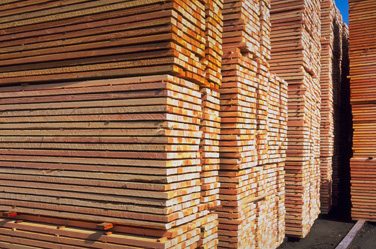California home builders say they have very little choice but to continue buying Canadian softwood lumber from places like British Columbia, even if US President Donald Trump issues a 25% penalty on imports next month.
The state is in the midst of its rebuilding efforts from the Pacific Palisades wildfires that ravaged the Los Angeles area.
Dan Dunmoyer met with BC Forests Minister Ravi Parmar on Friday in Sacramento stating their long-standing partnership could be in limbo if the tariffs are imposed.
Dunmoyer, who is the president of the California Building Industry Association told Vista Radio the rebuild will become a lot more costly.
“The price of lumber is already starting to go up some even without the tariffs in place out of uncertainty, which again is a reason not to move quickly on tariffs. I have heard as low as $7,000 on the low and up to $30,000 on the high end for increased costs per home. We are not sure yet until the market takes these risk factors into account.”
“We are very desirous to rebuild as quickly as possible and at the lowest cost possible. The timing of tariffs or additional costs to softwood lumber coming from Canada is very ill-timed.”
He added 80 per cent of Californian land is owned by the federal or state governments and can’t be logged.
Dunmoyer mentioned California also lacks mills, environmental policies and, supply chains that give local lumber production a boost.
“Even if we did (have permits) we don’t have the mills, the resources or the labour in place to quickly harvest so having the ability to bring in quality softwood lumber from Canada which we will need immediately not just for Los Angeles but for the state to also build its homes. It’s crucial.”
“The other aspect is when you bring lumber in from Canada it keeps the prices competitive in the United States assuming there are no large tariffs. This keeps the costs low in terms of building and rebuilding when there is more competition especially if there is quality competition. The only other country we have been able to pull lumber from is Russia and Siberia and that is not a country we should do business with.”
Trump’s additional tariff on most Canadian exports, would boost softwood lumber levies to almost 40 per cent when existing duties of 14.4 per cent are considered.
Dunmoyer mentioned the topic of lumber tariffs is a national concern south of the border as southern states like Florida and North Carolina were harder hit by Hurricane Helene, which struck last fall – both states are likely to require a large volume of Canadian lumber to aid in the rebuilding of homes.
“That rebuilding process will take years and that will be done with lumber and just the day to day building we do for new homes are remodeling across America requires lumber,” added Dunmoyer.
“The issue of tariffs is viewed by every state whether it’s Arizona, Oregon North Carolina or Florida. The tariffs know no boundary when it comes to the United States – within the entire country we will feel the entire impact. And that is again why we want both countries to come to the table and reach a mutual agreement that is acceptable,” said Dunmoyer.
“There are things in America that we produce better than in Canada and vice-versa and so for us, it is a conversation, and it is a trade agreement that is negotiated over time and with a common goal of meeting the needs of our respective citizens. We need to do it in a way that has as little negative impact on the cost of product for both Canadians and Americans.”
January’s wildfires around Los Angeles destroyed or damaged roughly 19,000 homes or structures.
Something going on in the Prince George area you think people should know about?
Send us a news tip by emailing pgnews@vistaradio.ca.








